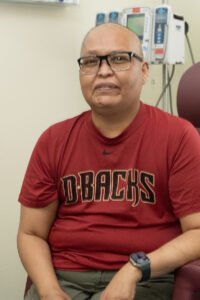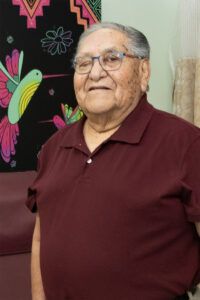FOR IMMEDIATE RELEASE
October 30, 2024
TUBA CITY — Every Monday and Tuesday, Muriel Goldtooth, a 46-year-old mother of two, experiences nosebleeds as a side effect of her weekly chemotherapy treatments at Tuba City Regional Health Care’s Specialty Care Center. “That’s on my good days when my condition is somewhat normal,” she shares with a smile.
Last November, Muriel decided to get a mammography exam at the TCRHCC, despite having no symptoms of cancer. “I was initially anxious, but I ultimately decided to go in for a mammogram. I wanted to be sure and understand the process, especially after hearing about a coworker’s experience,” she recalls.
The mammography led to further tests before Muriel learned that she had cancer. “I was in disbelief,” she said. “It took me a month to process what was happening and to understand the doctor’s words. I didn’t cry.”
Muriel’s unexpected diagnosis contrasts with the story of LeRoy Shingoitewa, a 79-year-old long-time educator. Almost 25 years ago, LeRoy unexpectedly fainted while at his school and taken to the hospital. “They found a polyp in my large intestine. It wasn’t too bad initially, so I delayed surgery for a year, but we kept monitoring it. Eventually, they operated and removed it,” he said.
For two decades, LeRoy was fine, following regular check-ups every five years. But in 2022, during a routine check-up, doctors discovered he had multiple myeloma, a rare blood cancer affecting various body parts. “My first thoughts were, ‘What does this mean?’ and ‘How bad is it?’ When you hear ‘cancer,’ many things run through your mind. The first being, ‘How long do I have to live?'”
Navigating Treatment and Recovery
Muriel’s surgery was initially delayed due to COVID-19 and was scheduled early this year. She faced tough decisions regarding her treatment options and chose to have both breasts removed to prevent future complications. This decision extended her chemotherapy by another six weeks. “I didn’t want to risk cancer cells spreading. It was my choice, and it gave me a sense of control,” she explains.
Since her surgery, Muriel has been visiting the Specialty Care Center for treatment. “Wednesdays are chemo days, and I’m there from 9 a.m. until six or seven in the evening. I feel nauseated and weary for days afterward. Losing my hair was the most devastating part. I cried the whole weekend, but then I decided to take control. It’s my choice, and my hair will grow back.”

“I am self-aware of how I look and how people look at me,” she said about her hair loss. “They look at me like ‘whoa.’ Because I have no hair. I tell myself ‘Hey, it’s okay. It’s fine. I’m going through something. It’s a badge of honor.”
Mood change is another symptom. “I get really angry. I know that anger comes from thinking why did I get this? Why did it happen to me?” she said. “It’s hard not to think that way. I have to think, you are going to be okay. You’re going to get out of this. That’s when I feel sad.”
LeRoy’s treatment began in March 2020. “My initial dose was strong. Whatever I ate went right through me, and I lost 45 pounds,” he recounts. After three and a half years of treatment, he now gets fewer shots, and he feels stronger.
Muriel chose to get her treatment at TCRHCC to avoid the financial challenges of traveling to Phoenix. “I like the staff here; they are knowledgeable and supportive. My family, co-workers, and the Tuba City community provide me with incredible support,” Muriel also said. “After my surgery my students, were sending me videos, messages, and emails all throughout recovery; which was uplifting.”
Importance of Support and Advocacy
Muriel’s emotional journey is supported by her family and students. She says, “When I feel depressed after chemo, seeing my family and students lifts me up. Their support helps me push through.” Her husband and two children, especially her 21-year-old, have been her pillars of strength.

LeRoy’s outlook on life has changed significantly. “I’ve learned to appreciate everything around me—family, friends, and the caring community at the Specialty Care Center. My focus now is on helping others with cancer and spreading hope.
The Specialty Care Center’s role in their recovery is profound. Tanya Riggs, Director of the Center said, “Receiving care close to home, with the support of family, traditional healing, and spiritual systems, empowers our patients and gives them hope. Our team, comprised of tribal community members, understands the principle of Ke’ and the importance of relationships with patients, their families, and caregivers. This improves cancer survivorship and the patient experience.”
Spreading the Message of Early Detection
When Muriel returned to work in April, her first message to her colleagues was: “You guys better get screened! Go get tested because it’s crucial. You never know if you have it — I didn’t.” Some took her advice.
Both Muriel and LeRoy are now in recovery, continuing their treatments. “Live your life to the fullest because you never know when it’s going to change. It really makes you evaluate your life and how you can make it better,” Muriel said.
LeRoy emphasized the importance of community and support. “My outlook on life is now about working with my family and helping others with cancer.
“Early detection can save lives, providing hope and a brighter future,” said Chief Executive Officer Joette Walters. “We urge people to schedule a screening today – for yourself, for your loved ones. “Treatment is crucial for a good life.”
# # #
